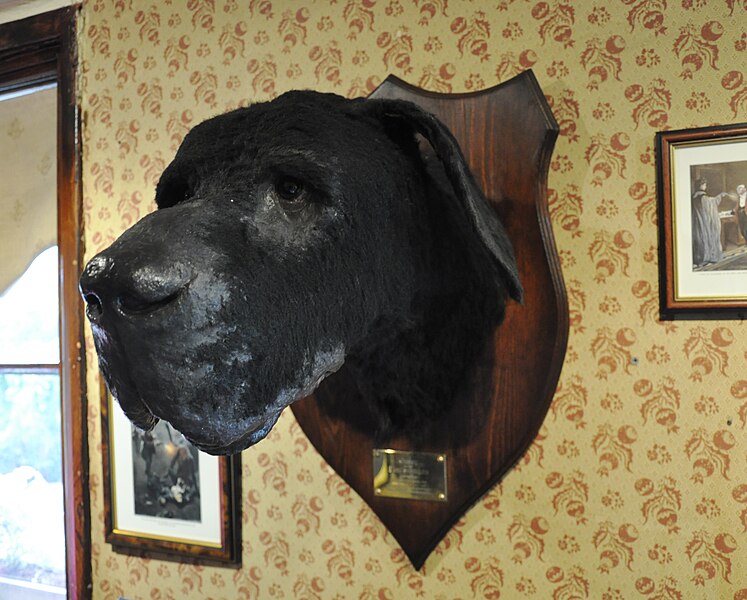 Mr. Burns of The Simpsons has a simple command to "release the hounds," and it could have its origin in The Hound of the Baskervilles, the 1959 adaptation of Sir Arthur Conan Doyle's third Sherlock Holmes novel, directed by Terence Fischer, which starts with an aristocrat sending loose his fiendish hounds to attack other human beings. From there, the movie is an aristocratic back-and-forth whodunit featuring a diabolical hound of hell, summoned to forever haunt the Baskervilles family, and of course, it features the most famous English detective in history trying to figure out who--or what--is really causing all this mayhem.
Mr. Burns of The Simpsons has a simple command to "release the hounds," and it could have its origin in The Hound of the Baskervilles, the 1959 adaptation of Sir Arthur Conan Doyle's third Sherlock Holmes novel, directed by Terence Fischer, which starts with an aristocrat sending loose his fiendish hounds to attack other human beings. From there, the movie is an aristocratic back-and-forth whodunit featuring a diabolical hound of hell, summoned to forever haunt the Baskervilles family, and of course, it features the most famous English detective in history trying to figure out who--or what--is really causing all this mayhem.Hugo Baskervilles (David Oxley), a cruel aristocrat, was the Gaston before there was Gaston. This guy is horrifyingly cruel to his servants, one of whom he nearly kills and another (the first servant's daughter) he stabs in the heart, just before he appears to be destroyed by some kind of terrible beast. Fast forward to the early 20th century, where Dr. Mortimer (Francis de Wolff) is reading to Detective Holmes (Peter Cushing) and Dr. Watson (Andre Morell) the spooky legend of the curse, but being men of science, Holmes and Watson are naturally skeptical. They do, however, agree to investigate. It's here where we meet the last of the Baskervilles, Sir Henry, played by the late, great Sir Christopher Lee, who is made up to be more handsome and a lot less grotesque than his previous outings with his friend Cushing at Hammer; his nice suits replace the rotting flesh and attire of Frankenstein's creature.
Because Henry's uncle, Sir Charles, has been killed mysteriously, Sir Henry is summoned from Johannesburg to run Baskervilles Hall in England. He, like his uncle, suffers from a heart problem, and when a tarantula is found in Henry's boot--a tarantula that could easily kill a man with a heart condition, Holmes tells us--Holmes suspects that foul play is involved. What adds to all these characters' angst is that a criminal has escaped from a nearby prison and could be the one engaging in all this mischief. But it could also be Henry's mysterious and angry-looking neighbor (played by Ewen Solon) and/or his Spanish daughter (Marla Lindi). Or it could be Dr. Mortimer, who has received a considerable sum of money from the will of Sir Charles, or it could even be Sir Henry himself who killed his uncle. One way or another, Mr. Holmes does not believe that there is any sort of supernatural "hound of hell" on the loose haunting about, ready to avenge what happened centuries before.
Lee became critical of how gruesome and disturbing horror films have become in recent years, and I can't imagine this adaptation of Doyle's famous story being scary to basically anyone, even in 1959. But that's not the intent, is it? Despite having never read the original novel or seen any of the other numerous adaptations (I have a DVD of the Basil Rathbone version but have never watched it), it's my understanding that this is not a horror story (but maybe I'm wrong). Why should it be scary, despite all the mist and howling our characters periodically hear? Still, as one of them mentions, "there is more evil around us here than I have ever encountered before."
The acting here is decent; Lee portrays Henry as a sympathetic figure, especially considering how helpless he is. Cushing is a joy to watch, as usual. Miles Malleson shows up in a fairly humorous comic relief part as the local bishop (and who, I think, we're at one point supposed to all suspect as being behind all this trouble). Cecil, the Spanish girl, is a somewhat interesting character bitter about being in England but intimately drawn to Henry. There's a hint of class warfare metaphors sprinkled throughout this film, and it really comes into focus during the scenes featuring these two. The reveal at the conclusion is a bit odd and slightly disappointing, but it is a thrilling climax nonetheless. It's better than The Curse of Frankenstein or Horror of Dracula. The Hound of Baskervilles is not perfect--"elementary" might be an appropriate adjective--but it's good fun and very much recommendable.
















0 comments:
Post a Comment